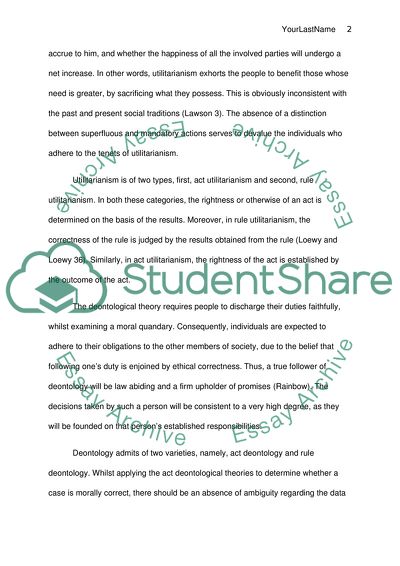Cite this document
(“Deontology and Utilitarianism Essay Example | Topics and Well Written Essays - 1750 words - 1”, n.d.)
Deontology and Utilitarianism Essay Example | Topics and Well Written Essays - 1750 words - 1. Retrieved from https://studentshare.org/social-science/1572305-describe-the-main-principles-of-the-two-normative-ethical-theories-of-deontology-and-utilitarianism-compare-and-contrast-the-two-theories-bringing-out-any-problems-or-limitations-you-see-in-each
Deontology and Utilitarianism Essay Example | Topics and Well Written Essays - 1750 words - 1. Retrieved from https://studentshare.org/social-science/1572305-describe-the-main-principles-of-the-two-normative-ethical-theories-of-deontology-and-utilitarianism-compare-and-contrast-the-two-theories-bringing-out-any-problems-or-limitations-you-see-in-each
(Deontology and Utilitarianism Essay Example | Topics and Well Written Essays - 1750 Words - 1)
Deontology and Utilitarianism Essay Example | Topics and Well Written Essays - 1750 Words - 1. https://studentshare.org/social-science/1572305-describe-the-main-principles-of-the-two-normative-ethical-theories-of-deontology-and-utilitarianism-compare-and-contrast-the-two-theories-bringing-out-any-problems-or-limitations-you-see-in-each.
Deontology and Utilitarianism Essay Example | Topics and Well Written Essays - 1750 Words - 1. https://studentshare.org/social-science/1572305-describe-the-main-principles-of-the-two-normative-ethical-theories-of-deontology-and-utilitarianism-compare-and-contrast-the-two-theories-bringing-out-any-problems-or-limitations-you-see-in-each.
“Deontology and Utilitarianism Essay Example | Topics and Well Written Essays - 1750 Words - 1”, n.d. https://studentshare.org/social-science/1572305-describe-the-main-principles-of-the-two-normative-ethical-theories-of-deontology-and-utilitarianism-compare-and-contrast-the-two-theories-bringing-out-any-problems-or-limitations-you-see-in-each.


